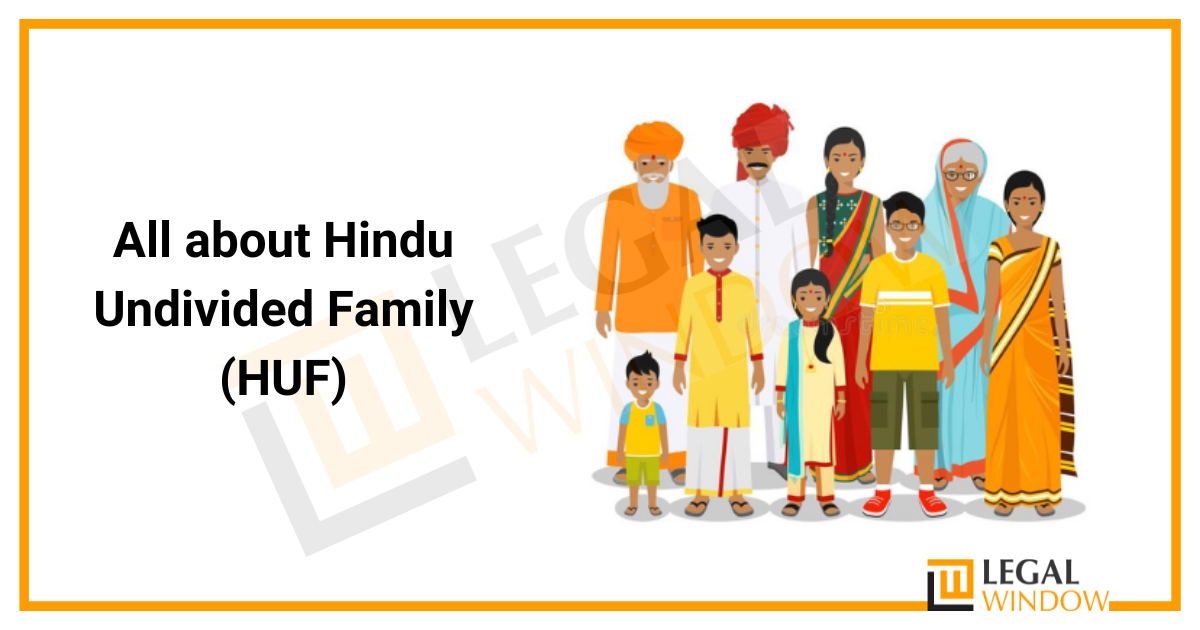 A Hindu Undivided Family (HUF) is any individual who is lineally derived from a common ancestor, including their spouses and unmarried daughters. A typical Hindu family consists of a male Hindu, his wife, and his unmarried daughters. When a daughter marries, she no longer belongs to her father’s family and becomes a member of her husband’s. The presence of a joint estate, on the other hand, is not required to form a joint family. A joint Hindu family, also known as a Hindu Undivided Family, might include a single male member and widows of deceased male members.
A Hindu Undivided Family (HUF) is any individual who is lineally derived from a common ancestor, including their spouses and unmarried daughters. A typical Hindu family consists of a male Hindu, his wife, and his unmarried daughters. When a daughter marries, she no longer belongs to her father’s family and becomes a member of her husband’s. The presence of a joint estate, on the other hand, is not required to form a joint family. A joint Hindu family, also known as a Hindu Undivided Family, might include a single male member and widows of deceased male members.
| Table of Content |
What is a Hindu Undivided Family?
HUF stands for Hindu Undivided Family, and it is formed by members of a family. The most senior member of the family known as “Karta”, is in charge of all HUF issues. When a kid is born, he or she instantly becomes a member of the HUF. The Hindu Undivided Family (‘HUF’) is considered a ‘person’ under Section 2(31) of the Income Tax Act, 1961 (hence referred to as ‘the Act’). For the purposes of assessment under the Act, HUF is a distinct entity. A HUF is a Hindu family that comprises all individuals lineally derived from a common ancestor, as well as their spouses and unmarried daughters.
A HUF cannot be formed by a contract; it is formed naturally inside a Hindu family. Even though Jain and Sikh households are not regulated by Hindu Law, they are considered as HUFs under the Act.
A HUF cannot be formed by a contract; it is formed naturally inside a Hindu family. Even though Jain and Sikh households are not regulated by Hindu Law, they are considered as HUFs under the Act.
Formation of Hindu Undivided Family
A HUF is founded through the creation of a deed between the family members. The deed must include information on the members of the family, the nature of the company, and other pertinent information about the HUF. On the basis of the notarised deed, an application for PAN is made in form 49A, and a bank account is opened in the name of the HUF.
A Hindu Undivided Family must have at least two members to be considered a joint family. The presence of estate or property is not required to constitute a Hindu Undivided Family. A HUF is a Hindu family that comprises all individuals lineally derived from a common ancestor, as well as their spouses and unmarried daughters. A HUF cannot be formed by a contract; it is formed naturally inside a Hindu family.
Characteristics of the Hindu Undivided Family (HUF)
The Hindu Undivided Family (HUF) has the following characteristics:
- Every member of the family can contribute to the shared corpus.
- The authority of a single individual, with involvement from the entire family.
- Tax advantages on deposits are available in numerous areas.
- Only with the agreement of all family coparceners can the corpus be split.
Documents required for opening HUF Account
The following are the documents required for opening a HUF Account:
- HUF will have its own PAN card, which should be generated concurrently with Karta’s PAN.
- A declaration form will be given, which each member must sign, specifying the name of Karta and declaring.
- They are the sole HUF members.
- Karta will be the only owner of the HUF account.
- Karta governs every transaction performed on behalf of the HUF account by each member of the family.
- Karta’s residential evidence.
- Karta’s identification document.
HUF Tax Advantages and Disadvantages
Advantages
Tax advantages are one of the most significant HUF benefits. These are some benefits of HUF:
- For the HUF account, tax deductions are available under Section 80C.
- Gifts valued up to Rs 50,000 would be exempt from tax. A father with a HUF account can give a higher-valued property or money to a son with a lesser HUF account. The present should be designated particularly for the son’s HUF. In such cases, tax breaks under sections 64(2) and 56(2) may be available.
- Corpus may be invested in tax-free money instruments.
- HUF members, like all other persons, are required to pay taxes each year. If a HUF member’s business turnover reaches Rs.25 lakhs or Rs. 1 crore, he or she must conduct a tax audit under the supervision of a licensed Chartered Accountant, as specified in Section 44AB of the Income Tax Act, 1961.
- The head of a HUF has complete authority to sign documents on behalf of other family members. They also have the authority to delegate the activities to any other senior member of the household.
- Adopted children are also eligible to join the HUF.
- Except for Kerala, HUF is recognized across India.
- One of the primary reasons families establishes HUF is to create two PAN Cards and submit taxes separately.
- HUF members can readily get loans.
Disadvantages
The following are the disadvantages of HUF:
- One of the biggest drawbacks of HUF is that every member of the family has equal rights to all of the family’s assets. The family’s common property cannot be sold unless everyone in the family agrees. Aside from that, births and weddings add to the number of family members.
- Closing a HUF is far more difficult than starting or creating one. The HUF may dissolve if the family is divided among a small number. After dissolving a HUF, the family’s assets must be dispersed among all family members, which can be difficult to handle at times. Furthermore, legal issues cause additional disruptions.
- The Income Tax Department considers HUF to be a separate tax entity. However, in today’s world, joint families are losing value and relevance. Several examples of HUFs fighting over minor matters or property are being reported these days. Furthermore, the number of divorces is growing on a daily basis. As a result of all of these issues, HUF is becoming less useful as a tax-saving strategy.
How fruitful is Hindu Undivided Family or HUF?
Because a HUF is considered a separate individual with its own bank account and PAN, it is particularly useful for tax planning rather than tax evasion. HUFs are entitled to deductions under Chapter VIA, such as 80C, 80TTA, and 80D. HUF is highly useful for people who have interest income from fixed deposits and fall into the 30% tax band. They can create a HUF and transfer a few fixed deposits into the name of the HUF.
By doing so, they can claim a tax-free benefit of Rs. 500,000 in their individual capacity as well as in their HUF capacity. HUF is subject to the same taxation as an individual. Returns on investments made in the name of a HUF are taxed in the HUF’s hands. HUF can own property in its name and receive rental revenue from it.
Takeaway
HUF, like any other program, has both positive and negative characteristics. Keeping these considerations in mind, HUF members should take care of their assets and property. When it comes to delivering property as a gift to a specific family member, the Karta should use caution. Only by completing the legal procedures will the designated individual be able to get the property.
Connect to our Experts at Legal Window and get all the concerned counsel regarding the taxation and benefits of Hindu Undivided Family. Our Experts would be Happy to Help.
LegalWindow.in is a professional technology driven platform of multidisciplined experts like CA/CS/Lawyers spanning with an aim to provide concrete solution to individuals, start-ups and other business organisation by maximising their growth at an affordable cost. Our team offers expertise solutions in various fields that include Corporate Laws, Direct Taxations, GST Matters, IP Registrations and other Legal Affairs.
Categories
- Agreement Drafting (23)
- Annual Compliance (11)
- Change in Business (36)
- Company Law (148)
- Compliance (90)
- Digital Banking (3)
- Drug License (3)
- FEMA (17)
- Finance Company (42)
- Foreign Taxation (6)
- FSSAI License/Registration (14)
- GST (120)
- Hallmark Registration (1)
- Income Tax (202)
- Latest News (34)
- Miscellaneous (165)
- NBFC Registration (8)
- NGO (14)
- SEBI Registration (6)
- Section 8 Company (7)
- Start and manage a business (21)
- Startup/ Registration (130)
- Trademark Registration/IPR (40)
Recent Posts
About us
LegalWindow.in is a professional technology driven platform of multidisciplined experts like CA/CS/Lawyers spanning with an aim to provide concrete solution to individuals, start-ups and other business organisation by maximising their growth at an affordable cost.








